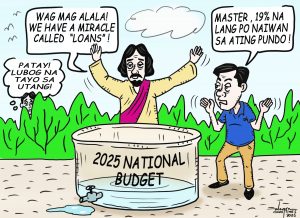WE could not help but appreciate with all our heart the gesture of Vice President Sara Duterte for finding time to visit some of Davao City’s schools in the rural barangays during last Monday’s Barangay and Sangguniang Kabataan Elections (BSKE), without doubt, primarily as Secretary of the Department of Education (DepEd).
One of the rural schools the VP visited was the very place where we voted in Talandang, Tugbok in the third district. For certain she was there to check on whether or not the teachers who were assigned poll duties were doing their job in accordance with the people’s expectation.
VP and Education Secretary Sara also took time out of her short visit in Talandang Elementary School to talk to her constituents who immediately gathered around her. Her dropping by the school was not announced nor was it ever hinted. Thus, everybody inside and outside the campus was clueless as to who the visitor was when her vehicle stopped by the gate and her security officers opened the vehicle’s door. Her presence awed the crowd of voters.
*****************************
Talking of last October 30’s BSKEs, we were happy to note that the Commission on Elections had thought of implementing some kind of facilitated voting scheme for senior citizens, persons with disability, pregnant women, seniors with co-morbidity and others who have mobility constraints. We belong to the last group since we had an operation on our bladder only a little two months ago.
The COMELEC facilitative scheme was called the Emergency Accessibility Polling Precinct or EAPP. Unfortunately our expectation of being facilitated in the casting of our vote was flipped over. It turned out that since most people under such physical conditions wanted to cast their votes the easiest possible way, the EAPP center became the convergence of hundreds of voters – all under priority.
We were outside of the EAPP room starting at about 8:30 in the morning and we were standing for about an hour before we were able to have a chair to sit. So do the rest of the seniors and other movement constrained people who came after us. After getting a seat, we noticed that there seemed to be no movement; neither was there any activity inside the polling room where a number of senior voters were already around and appeared to be waiting.
The thickening crowd of voters under the categories earlier stated was already getting restless and questions were already raised in loud voices inquiring what was happening. There were already senior voters complaining of fatigue after standing for so long.
In our case we were already on the line for about an hour and a half. It was only then that a member of the electoral board announced that they were waiting for the person who went to our regular precinct to get the names of the voters under the earlier-categories for them to be able to start the casting of votes. And in just a few minutes the board announced that those who are in a hurry may just have to go to their regular precinct and cast their votes there.
That was when the exasperation got to the shouting point. The length of time that they, including us, were made to wait outside the room with temperature so humid for people in their twilight years but are still willing to do their sacred duty of voting for their leaders, was long enough to bear.
Of course, the undesirable supposed facilitative voting process for voters who belong to the earlier-described people categories may not be the same in other barangays of the city. For certain some EAPP may have been better coordinated and processes well prepared in advance to allow smooth voting.
But for barangays that have EAPP processes similarly situated as in our polling center we are sorry if they also have the same negative experience as ours.
*****************************
Honestly though, we believe that the latest BSKE was whole-heartedly accepted by the electorate as a means for inclusive and grassroots governance. The massive turnout of voters during last Monday’s polls was more than enough indication that people now see the importance of the BSKE in the governance process.
We hope this kind of participation will be seen in the succeeding BSKEs not just in the elections of local and national officials.
-30-

